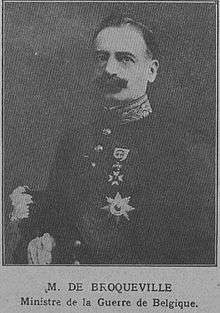Belgian general election, 1914
|
| |||
| |||
88 of the 186 seats in the Chamber of Representatives | |||
|---|---|---|---|
|
| |||
| |||

Partial general elections were held in Belgium on 24 May 1914.[1] The result was a victory for the Catholic Party, which won 41 of the 88 seats up for election in the Chamber of Representatives.[2]
The Catholics had formed the government continuously since 1884; the incumbent de Broqueville government was in office since 1911.
Under the alternating system, elections were only held in four out of the nine provinces: Hainaut, Limburg, Liège and East Flanders. This was the last time this system was applied, as the next elections in 1919 saw the introduction of full four-year terms.
The elections occurred shortly before the outbreak of World War I. The newly elected legislature met for just one day in a special session: on 4 August 1914, when King Albert I addressed the United Chambers of Parliament upon the German invasion of Belgium. The parliament met again after the war in November 1918.
Results
| Party | Votes | % | Seats | Change |
|---|---|---|---|---|
| Catholic Party | 570,806 | 42.8 | 41 | –2 |
| Belgian Labour Party | 404,701 | 30.3 | 26 | +1 |
| Liberal Party | 326,922 | 24.5 | 20 | +1 |
| Christene Volkspartij | 22,619 | 1.7 | 1 | 0 |
| Other parties | 9,933 | 0.8 | 0 | 0 |
| Invalid/blank votes | – | – | ||
| Total | 1,334,581 | 100 | 88 | 88 |
| Source: Nohlen & Stöver | ||||
Seats up for election
Seats in the provinces of Antwerp, Brabant, Luxembourg, Namur and West Flanders were not up for election.
| Province | Arrondissement(s) | Chamber |
|---|---|---|
| Limburg | Hasselt | 3 |
| Tongeren-Maaseik | 4 | |
| East Flanders | Aalst | 5 |
| Oudenaarde | 3 | |
| Gent-Eeklo | 12 | |
| Dendermonde | 4 | |
| Sint-Niklaas | 4 | |
| Hainaut | Tournai-Ath | 6 |
| Charleroi | 11 | |
| Thuin | 3 | |
| Mons | 7 | |
| Soignies | 4 | |
| Liège | Huy-Waremme | 4 |
| Liège | 13 | |
| Verviers | 5 | |
| Total | 88 | |
Elected members
Apart from the re-elected members, the following six members were newly elected:
- Paul Van Hoegaerden-Braconier (liberal), elected in Liège to replace Charles Van Marcke de Lummen (liberal), who did not seek re-election.
- Alfred Journez (liberal), elected in Liège to replace Ferdinand Fléchet (liberal), who was not a candidate due to health reasons.
- Paul-Emile Janson (liberal), elected in Tournai to replace Albert Asou (liberal), who did not seek re-election to the Chamber.
- Paul Neven (liberal), elected in Tongeren-Maaseik to replace Auguste Van Ormelingen (catholic).
- Clément Peten (liberal), elected in Hasselt to replace Albert de Menten de Horne (catholic).
- Joseph Wauters (socialist), elected in Huy-Waremme to replace Jules Giroul (liberal).
References
- ↑ Nohlen, Dieter; Stöver, Philip (31 May 2010). Elections in Europe: A data handbook. Nomos Verlagsgesellschaft. p. 289. ISBN 978-3-8329-5609-7.
- ↑ Nohlen & Stöver, p308